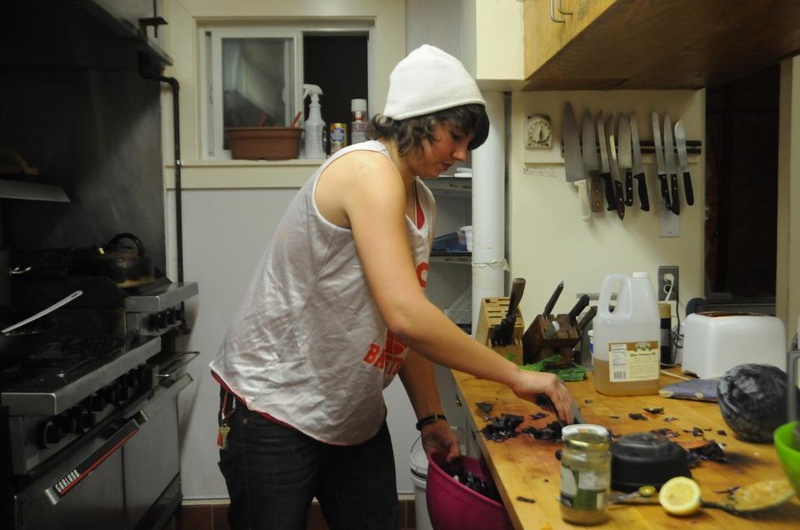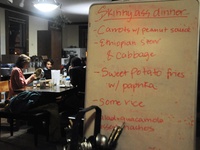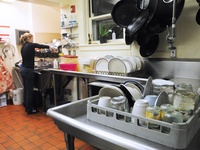At 6:30 p.m. on a recent Sunday evening, students began to trickle into the dining room of the Dudley Co-op and help themselves to the baked tofu, vegan pasta, and salad from the mismatched pots on the table in the entrance hall.
Unlike upperclassmen living in the House dining halls, residents of the Dudley Co-op eat together every night and work with one another to cook the all-vegetarian options and homemade bread.
The food represents the community of 3 Sacramento St.—co-operative and, as Martin Eiermann ’10 put it, “quirky.”
‘FOOD IN INSANE QUANTITIES’
Earlier that afternoon, (Artemisha) Misha S. Goldfeder ’10 rummaged around the large walk-in refrigerator in the Co-op kitchen, searching for ingredients for that night’s dinner.
Buying food for the 32 Co-op residents can be a daunting task, according to Rebecca R. Rojer ’10, but the Co-op residents split up duties to make the process easier.
“It’s cool getting food in insane quantities, and it’s about 50 percent cheaper than retail,” Rojer said.
The co-op works with bulk distributors and a stand at the Harvard Farmers’ Market to buy ingredients. Along with the communal labor, these deals allow the Co-op to offer a significantly lower board cost than the traditional Harvard meal plan. Board was $750 this past semester, according to Robin S. Bellows ’11, while eating at a dining hall cost over $2000 per semester, according to the Financial Aid Office website.
The quality and type of food often changes from semester to semester because the community is so small and as the character of the residents changes, so does the food, Rojer added.
“There are some times when people care about food politics and other years when people are just hungry,” Rojer said.
After finding what she needed, Goldfeder set a large cookbook on top of ten blocks of tofu on the table next to her. The tofu has to drain in order to be cooked properly, she explained.
Although many residents eat meat, all Co-op meals are strictly vegetarian and offer vegan dishes. Residents also opt for organic options if they are not too expensive.
“I much prefer the fresh vegetables here. When I go to a dining hall it all kind of tastes the same—like nothing,” Rojer said.
While residents like Rojer prefer the fresh vegetables to typical House dining Hall fare, others acknowledge it appeals to a certain kind of character.
“It’s the kind of things that a bunch of scrawny vegetarians like to munch on,” said Remeike J.B. Forbes ’11, one of the Co-op Co-Presidents.
Read more in News
Experts Discuss Drug Cocktail
















